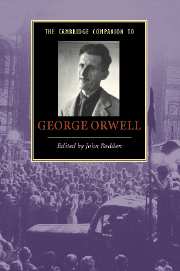Book contents
- Frontmatter
- 1 A political writer
- 2 Orwell and the biographers
- 3 Englands His Englands
- 4 The truths of experience: Orwell’s nonfiction of the 1930s
- 5 The fictional realist: novels of the 1930s
- 6 Orwell’s essays as a literary experience
- 7 ‘My country, right or left’: Orwell’s patriotism
- 8 Orwell and the British Left
- 9 Orwell, anti-Semitism and the Holocaust
- 10 Orwell, Socialism and the Cold War
- 11 Animal Farm: history as fable
- 12 Nineteen Eighty-Four: context and controversy
- 13 Orwell, the academy and the intellectuals
- 14 Orwell for today’s reader: an open letter
- 15 George Orwell: a bibliographic essay
- 16 Why Orwell still matters
- Further reading
- Index
11 - Animal Farm: history as fable
Published online by Cambridge University Press: 28 July 2007
- Frontmatter
- 1 A political writer
- 2 Orwell and the biographers
- 3 Englands His Englands
- 4 The truths of experience: Orwell’s nonfiction of the 1930s
- 5 The fictional realist: novels of the 1930s
- 6 Orwell’s essays as a literary experience
- 7 ‘My country, right or left’: Orwell’s patriotism
- 8 Orwell and the British Left
- 9 Orwell, anti-Semitism and the Holocaust
- 10 Orwell, Socialism and the Cold War
- 11 Animal Farm: history as fable
- 12 Nineteen Eighty-Four: context and controversy
- 13 Orwell, the academy and the intellectuals
- 14 Orwell for today’s reader: an open letter
- 15 George Orwell: a bibliographic essay
- 16 Why Orwell still matters
- Further reading
- Index
Summary
George Orwell considered Animal Farm (1945) his breakthrough, the book which brought together his gifts as a novelist with his commitment as a political writer. 'Animal Farm was the first book in which I tried, with full consciousness of what I was doing, to fuse political purpose and artistic purpose into one whole', he wrote in his 1946 essay 'Why I Write'. The Spanish Civil War, which began in 1936, turned the storyteller and journalist into a political writer, and the experience of fighting in that war alongside idealistic young Trotskyists and anarchists made him deeply hostile to the Soviet Union. He felt that Stalin had damaged the Republican cause in Spain in his effort to control it, just as he had betrayed the revolution at home. As Orwell saw it, the Soviet Union had become a brutal dictatorship built around a cult of personality and enforced by a reign of terror. He was especially incensed by the apologetics of its Western sympathisers, who felt that the cause of building socialism in a backward country excused many abuses. As he saw it, the rise of totalitarianism in Russia and Germany in the 1930s made his own political commitments inescapable. 'Every line of serious work that I have written since 1936 has been written, directly or indirectly, against totalitarianism and for democratic socialism, as I understand it'. Above all, he adds, 'what I have most wanted to do throughout the past ten years is to make political writing into an art' (CEJL, 1:28).
- Type
- Chapter
- Information
- The Cambridge Companion to George Orwell , pp. 133 - 145Publisher: Cambridge University PressPrint publication year: 2007
- 1
- Cited by

